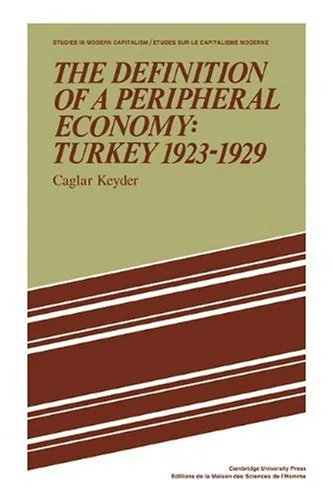The Definition of a Peripheral Economy: Turkey 1923-1929
4.3
Reviews from our users

You Can Ask your questions from this book's AI after Login
Each download or ask from book AI costs 2 points. To earn more free points, please visit the Points Guide Page and complete some valuable actions.Related Refrences:
The Definition of a Peripheral Economy: Turkey 1923-1929
Welcome to an in-depth exploration of the book The Definition of a Peripheral Economy: Turkey 1923-1929 by Caglar Keyder. This book offers a profound examination of Turkey's economic journey during a transformative period in its history. Through meticulous research and insightful analysis, Keyder delves into the nuances of why certain economies are termed "peripheral" and how Turkey, in the years following its establishment as a republic, fits into this framework.
Detailed Summary
The Definition of a Peripheral Economy: Turkey 1923-1929 navigates the complexities of Turkey’s economic landscape during the early years of the Republic, following the fall of the Ottoman Empire. It seeks to define what comprises a peripheral economy by exploring Turkey's socio-economic conditions during the critical post-independence period. The book provides a historical context of global economic structures and places Turkey within this context as a case study of a nation striving to balance tradition with modernization.
Keyder critically assesses the policies implemented by Mustafa Kemal Atatürk and his government that aimed at modernizing the Turkish economy. The analysis extends to the political and economic ideologies that influenced these policies and their subsequent impact on Turkey’s position in the world economy. With careful attention to detail, Keyder explains the agricultural focus, industrial development attempts, and the navigation of foreign influences that characterized Turkey’s economic strategies during this period.
Key Takeaways
- Defining Peripheral Economy: Understand the characteristics that define a peripheral economy through the lens of Turkey's economic history.
- Economic Policies and Outcomes: Gain insights into the policy decisions made during the formative years of the Turkish Republic and their long-term implications.
- Global Context: Explore how global economic trends and pressures influenced Turkey's economic path in the early 20th century.
- Balance of Tradition and Modernization: Learn how Turkey's efforts to modernize while retaining cultural identity impacted its economic development.
Famous Quotes from the Book
"In the shadows of the fallow empires, new nations emerge not only with renewed vigor but with the burdens of their historical legacies."
"To navigate the complexities of growth, a nation must understand its place in the broader economic tapestry."
Why This Book Matters
The Definition of a Peripheral Economy: Turkey 1923-1929 is a crucial resource for students, historians, and economists interested in understanding the economic dynamics of nations classified as peripheral economies. The book offers significant insights that contribute to the broader discourse on economic development, global inequality, and the paths nations take in carving out their economic identities. By situating Turkey’s early republican era within global economic frameworks, Keyder provides a reference point for comparative analyses with other emerging economies. The book's relevance extends beyond Turkey, offering lessons applicable to current global economic challenges and transformations.
Free Direct Download
You Can Download this book after Login
Accessing books through legal platforms and public libraries not only supports the rights of authors and publishers but also contributes to the sustainability of reading culture. Before downloading, please take a moment to consider these options.
Find this book on other platforms:
WorldCat helps you find books in libraries worldwide.
See ratings, reviews, and discussions on Goodreads.
Find and buy rare or used books on AbeBooks.
1291
بازدید4.3
امتیاز50
نظر98%
رضایتReviews:
4.3
Based on 0 users review
"کیفیت چاپ عالی بود، خیلی راضیام"
Questions & Answers
Ask questions about this book or help others by answering
No questions yet. Be the first to ask!



